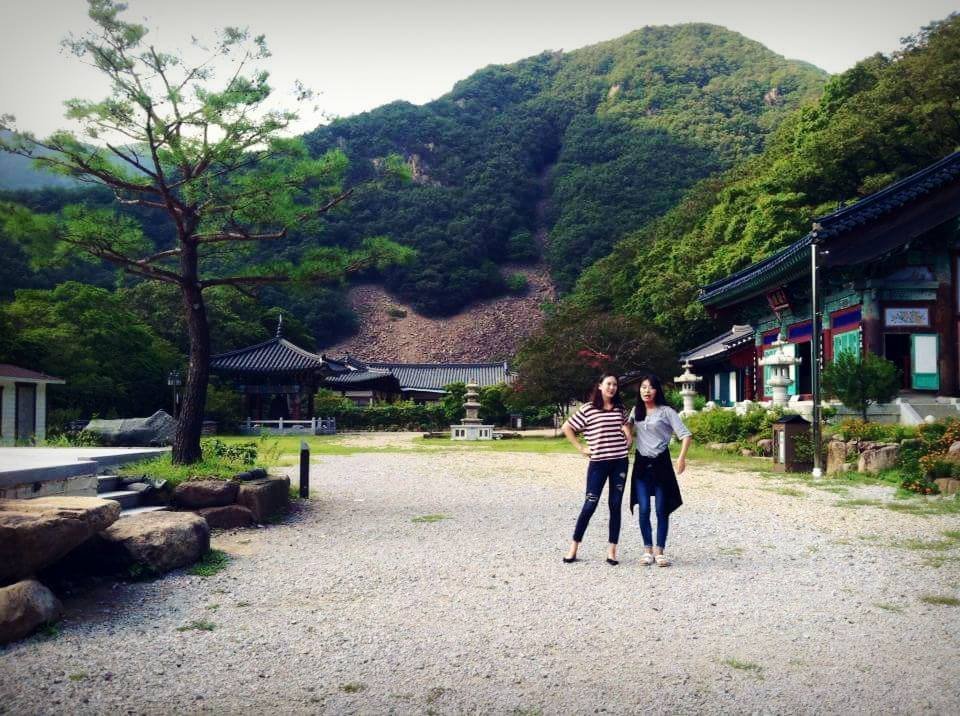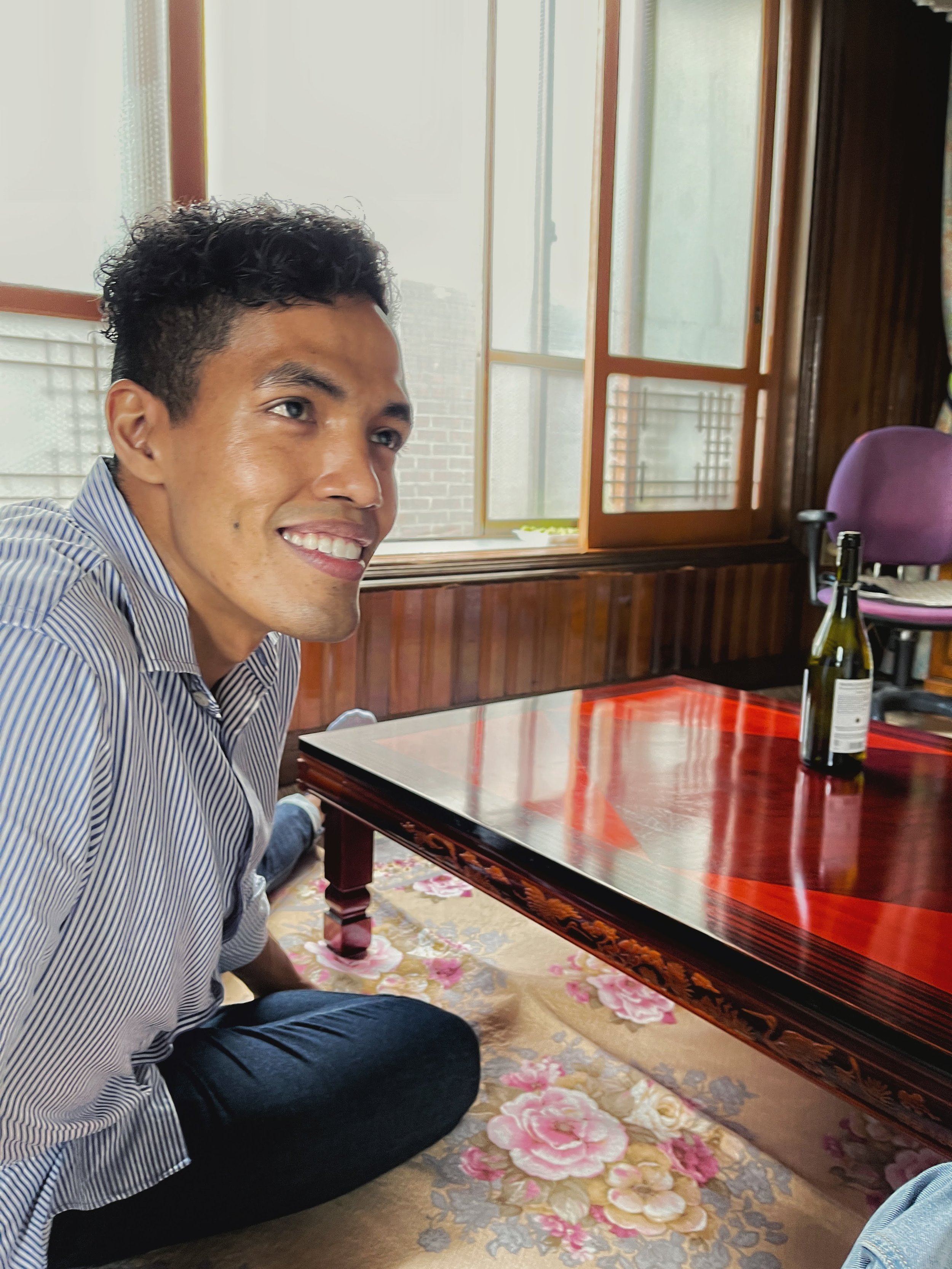Happy Chuseok
모든 소원이 이루어지는 즐거운 추석되길 소망합니다.
May this be a joyful Chuseok when all your wishes come true.
In Korea, there are two major holidays -
Lunar New Year
and Chuseok
Every year, we wait impatiently for these holidays to roll around; they are the only respite we get in this workaholic country. If you’re a woman and spending the obligatory time with family during the holidays, then you can expect to be cooking and cleaning for most of the time. It’s just how things go.
Chuseok holds complicated memories for me.
Growing up, we didn’t celebrate it at home because it wasn’t a well-known holiday outside of Korea. We didn’t have Korean family to visit nor did the families around us celebrate it. Like all holidays, they are more bitter than sweet when commemorated alone.
During Chuseok, we pay our respects to our family members who have passed before us. In my case, this is my grandfather.
I have no memory of him, as he passed before I can remember, and the only image I have of him is one faded photograph. He stares out of it gloomily, his face drawn and his eyes black. No matter how many times I scan his face, I see no sign of warmth, no sigh of familiarity nor friendliness. He is like a ghost, not somebody that I should know. It is strange to think that he continues to exist inside of me.
The first time I celebrated Chuseok with my Korean family I was about 20.
My Korean family and I all went to my grandfather’s grave.
The grassy mound and small, stone marker was all we had to remind us that below the dirt were the remains of the man who haunted my Korean family with the memories of his unkind and harsh ways.
We cleared the grave, my 큰삼촌 (eldest uncle) did the 큰절 (bow that places your forehead to the ground) and offered the soju in a small glass. My grandmother watched, emotionless and still, as my uncle threw back the alcohol with one swift movement. My grandfather’s portrait watched silently from where it had been placed. Then we all sat on a mat and had a picnic of fruit, dates, traditional snacks and 송편떡.
In the next ten years, we never went and visited the grave again.
Chuseok began as a symbol of reconnecting with my Korean family. Finally, I could sit on the floor and share a meal at the table, just like other Korean children had grown up doing. Finally, I was allowed to cook together, clean together, bring gifts, bow to my grandmother and play games with my cousins. All of these small traditions I had never experienced growing up were now my yearly gifts, things I could look forward to.
And every year, we laid out my grandfather’s solitary portrait in front of the table laden with food, each dish placed exactly where they should be according to the traditional rule book that my uncle had. The room would be hushed and my grandmother would sit on a chair and watch, her face expressionless. Uncle bowed, offered the soju, drank it, and then grandfather’s portrait went back to its hiding place, where it would stare blankly into the dark for another year.
My 외숙모 (mother’s brother’s wife) cooks every year. She has rough hands and a rough accent, but her food is better than anything you will find in a fine dining traditional Korean restaurant. She cooks the same thing -
갈비찜, 나박물김치, 동태전… and then we finish with freshly cut pear apples and 참외. (Forgive me for not writing in English, but I don’t know what the foods would be called… and somehow they are much more delicious-looking written in Korean.) We usually watch dramas and chat, while sipping on 수정과 or even share a dash of special wine that my uncle breaks out. “잔!” We cheer together, clinking our small glasses. I respectively turn my head away from my elders as I drink. It’s second nature now.
Sometimes, I wish my memories of Chuseok remained like that - me, freshly re-introduced to the family as an adult and absorbing everything that I had never experienced as a child, and my uncle and aunt joyfully showing me how to do this, how to do that, pointing out the map of Korea on the wall, showing me old photographs of my parents before I was born.
In some ways, it’s better that way; to be unaware of the family secrets and unaware of the backstories and pain. If you missed out on all of that, too, then nobody has to teach you how to tiptoe around it. I could come smiling every year to the Chuseok holidays, because I genuinely was happy to see everyone.
Families are certainly complicated. Korean families especially so. My grandmother was married very young to a man who was decades her senior, and who had never shown her affection. She worked very hard to keep her family alive, even through extreme hardship and illness. My grandfather was a severe man, and I only know the story of his disownment by his own father, and his death. My grandmother was left behind at a very young age and had to raise a large family all on her own, sometimes forced to be cruel to keep alive.
“No money, no choice,” my mother told me once.
In such stories, love is stamped out by the cruel requirements of survival. I know it is not easy to forgive such a childhood.
As the years went by, whenever September rolled around and the cheerful Chuseok commercials started showing up in every shopping center and tv screen, I began to feel a new weight grow - the weight of duty.
Duty is what keeps many families gathering together during Chuseok. Duty is what keeps my grandmother watching as my uncle lays out my grandfather’s portrait. Duty is what pressures my uncle’s shoulders as he touches his forehead to the ground. Duty is what drives my 외숙모 from sunrise to midnight, cooking tirelessly in her tiny kitchen. Sometimes, in our family, I believe it is love. Sometimes, I think it’s just duty.
I have two distinct memories from Chuseok holidays past.
One was when I was studying at Yonsei University for a year and went to my uncle’s house for the break. They asked me how long I was staying in Korea for and when I answered that I was leaving after one year, my grandmother got up abruptly.
“Where are you going?” My uncle asked, surprised.
”Mother-in-law, please, sit down. We’ll drive you home later.” My aunt pleaded.
But my grandmother would not be deterred. Her stubbornness is legendary. She insisted that she wanted to leave, saying in her cracked voice, ‘what’s the point of staying with this kind of family.’
My uncle and aunt tried to cajole her to sit, until my grandmother finally burst out, ‘if she wants to go to America, or wherever, whatever, she can go.’
To which my aunt replied sharply, “If she stayed for one year or for the rest of her life, Becky is always welcome in our house.”
Grandmother waved one dismissive hand and stepped outside the door until my uncle gave in and drove her home.
At the time, I remember being confused and hurt. Now when I think back to that moment, I feel only sorrow and a resolve to make up for all of the things my grandmother never had.
My grandmother saw two of her children leave Korea at young ages, married to Americans and never able to come back. One daughter she has seen only once in over thirty years, disconnected by digital illiteracy and mental illness.
Loss of family connection is a cruel reality to mixed Korean homes, something many of our own parents have faced in their lifetimes.
Now when I call my grandmother, I tell her that I miss her and love her; words I have the honor to say, words she heard so little from her own children. She always brushes me off, but through the phone screen I see how her eyes become shiny with tears.
The second incident was a strange and serendipitous run in with the past.
In the 80s, my parents were introduced to each other through a mutual friend - we call him Mr. Hong. I will share that story another time, but needless to say, Mr. Hong’s matchmaking powers worked. One Chuseok, as my uncle, aunt, cousin and I were taking a post lunch stroll around a nearby park, I heard somebody shout my name. Turning around, it was a young woman, and standing beside her, to my utter astonishment, was Mr. Hong.
Mr. Hong, his wife, and three kids were out for a walk when one daughter recognized me from my instagram. Any pretense of Korean manners completely forgotten, we all clutched hands and hugged each other, laughing in amazement over this unexpected meeting. We took some photos to show my parents.
“How is your dad?” Mr. Hong asked, his eyes twinkling behind his glasses.
“He’s really good,” I replied, “he talks about you often.”
“Ah, your father,” Mr. Hong said fondly, “he is a good man. I hope I can see him again one day.”
In that moment, I felt that when it comes to old friends, distance is really nothing at all.
Chuseok is a holiday that traditionally celebrates the plentiful harvest. We give thanks for the food we have and the fruit of our labors. Though physically I didn’t plant anything, I quietly give thanks for the fruits of my labor, too. I have done my best to reconnect with my Korean family, navigating through secrets, bitterness and unresolved sufferings, and have planted the seeds of forgiveness and love that I could. Who knows if they’ll ever bloom, but it’s definitely worth the try.
Now, I celebrate a small Chuseok with Cedric - it is my promise that I will create and cherish this new start of a family. Chuseok is a time of restoring relationships and I remember that, every year.
As we say,
올해도 즐겁고 풍성한 한가위가 찾아왔습니다.
가정에 보름달처럼
차오르는 행복이 깃드시길 기원합니다.
Once again, a joyful and abundant Chuseok has arrived this year.
Rising like the full moon, may your family be filled with happiness.






